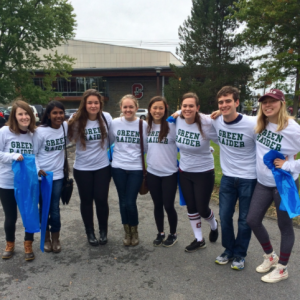-MaryKathryn McCann ’18
Take a few moments to think about an early summer or late spring morning. People normally think of sounds such as birds singing, crickets chirping, and early morning commuters on their daily drive. These sounds are all considered to be part of the environment’s soundscape. A soundscape is composed of the biophony, all biologically sourced sound; anthrophony, sound caused by humans; and geophony, sounds emitted by nonbiological sources of a specific location.¹ From a soundscape, information about the overall health of an ecosystem can be identified.

Recording in the woods on the Colgate Ski Hill.
Over this past summer, under the direction of Professor Ana Jimenez and Director of Sustainability John Pumilio, Erin Biggar, Karl Brown, Sydney Ziatek, and I started a longitudinal study of the soundscape of the Colgate Ski Hill. The recordings of the soundscapes focus mainly on birds. Male birds sing in order to claim territory and attract mates, but singing is very energetically costly to the birds. The collected recordings are able to provide insight into the richness and abundance of bird species in the area; these recordings are then quantified and used to calculate the change in the frequency and intensity of sounds over the breeding season and from year to year due to climate change and increased anthropogenic noise due to changes on Colgate’s campus.
The data collection of this experiment involved taking recordings of individual birds and soundscapes during most dawns and dusks for 7 weeks of the late spring and early summer. The recordings collected were analyzed using computer programs, R and Raven, to understand how the various songs produced by the birds changed over the breeding season and with changes in temperature. Our current data suggest that with continued temperature increases, the bioacoustical sound will decrease. With the increase in temperature, songbirds will be more energetically challenged to attract mates and to breed. This is because most of the energy of a bird will be used in order to keep its temperature regulated, and less energy will be allocated to singing. As temperatures rise, it is believed that bird migration patterns will alter in response. The birds could fly north earlier and fly further north. This change could have damaging effects on the bird population. The change could create more competition for food and territory among species of birds, driving out many bird species and creating, as Rachel Carson states, a “silent spring.”

Spectrogram from an individual recording of a chestnut sided warbler from the top of the Colgate Ski Hill.
In order to understand the changes that are happening to our forests and how these may impact bird populations, we first need to look at the causes of global climate change, and the major one is human activities that release greenhouse gases. Colgate is working towards climate neutrality by 2019 and it is one way that we can help offset the negative effects of climate change. It is up to us to make sure Colgate’s goal of carbon neutrality is reached and that our own actions are environmentally conscious. Our collective actions caused global warming; therefore, our collective actions can help slow down climate change.
Visit this website to check out Colgate’s soundscape: https://colgatesoundscape.wixsite.com/colgatesoundscape






